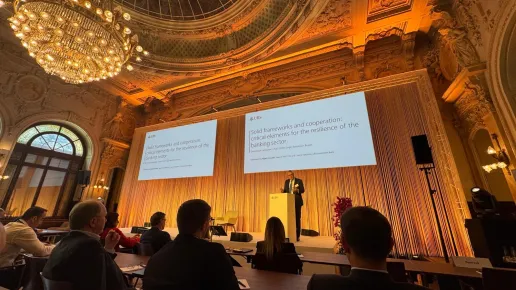[CHECK AGAINST DELIVERY]
Good afternoon. It is my pleasure to address you today and thank you for the invitation be a part of this wonderful programme. Greetings to all of you from Brussels – I know we have people connected from all over the world so, whether you are near or far, I appreciate you taking the time to listen and engage today.
If it is ok for all of you, I propose to speak for about fifteen minutes and then allow for some time for a questions and answers session.
My remarks will be split into two parts this afternoon.
The first part will look at the characteristics and functioning of the SRB and how we might compare to some other jurisdictions worldwide.
The second part of my intervention here today will look at the priorities and potential challenges for resolvability in Europe’s Banking Union countries.
Then I hope we will have some time for a short questions and answers session.
So, with that, let’s take a look at the SRB.
[1. The SRB/SRM– characteristics]
The SRB is the central and independent resolution authority for the twenty one EU countries that have chosen to be in the Banking Union. Together with these countries’ national resolution authorities, we form the SRM, which is the second pillar of the Banking Union. The first pillar is the Single Supervisory Mechanism, based at the ECB in Frankfurt.
Resolution and supervision of banks centralised at EU level is a relatively new departure. Although we had a European currency since 1999, regulation of banks was all done at national level until after the financial crash. It was only a decade ago that a decision was taken to set up the SSM and the SRM.
This meant that for the first time, banks operating nationally, for example, were to be regulated by pan-European authorities – but not exclusively so, since national authorities continue to have an important role to play.
In Europe in the past decade, new laws were introduced and new organisations were created in order to carry out work on supervision and resolvability. If we compare and contrast this to the US, we see that the FDIC has been around for ninety years. In the UK, the Bank of England, founded over three hundred years ago. This means that all the governance structures were established long ago in these two examples. Even if the area of resolution is a new concept in all regions, in Europe, we did not have well-established cross-EU watchdogs, which is a key difference.
Although the SRB is the central authority, there are many actors involved. In the Banking Union’s SRM, for example, we cannot take a resolution decision by ourselves. It must be endorsed by the Commission. We also have to work very closely with the NRAs who are tasked with implementing SRB decisions.
The Single Resolution Fund is another point of difference between the European, US and UK system. In the US, the equivalent of the Single Resolution Fund doubles up as a DGS fund. There, the DGS is centrally controlled. This is far from the case in Europe, where DGSs are managed at national and sometimes regional level. In the UK, we see the UK government promises to make funds collected through a bank levy available, should funds be needed to implement a resolution. Money is available, but not in the same way as we have in the Banking Union.
Looking to the SRB’s governance structure, we have five full time board members to manage the day-to-day decision making. However, we also have a plenary formation, where all twenty-one Banking Union countries come together to have their say.
The SRB is tasked with ensuring around 120 of the largest banking groups in Europe are resolvable. However that does not mean they are all G-SIBs. We have a massive range of banks under our remit because we have a wide variety of countries and banking systems in the Banking Union. What is considered a large bank in one country would be tiny in another. Added to that, twenty one different legal systems for things like insolvency proceedings.
So what are the key takeaways about the differences between regions?
The first is that the decision-making process is more complex in Europe than in other regions. I am not saying complexity is a bad thing, however, it presents its own challenges in a resolution weekend when decisions need to be taken and where time is limited.
The second take-away is to be aware, that compared to other places, our centralised banking supervision (SSM + SRM) framework is very young. So, I think we have to give it time to see how the various frameworks works, or don’t work as the case may be, before trying to change too much, too quickly. The framework for supervision and resolution in Europe is after all just a decade old and time will be certainly needed so that it can mature into a stable framework.
[2. Next steps for SRB and current priorities]
Now I’d like to move to the second half of my speech which will focus on some of the priority areas when it comes to resolution planning and preparedness. As you may now, I took the helm as Chair of the SRB in January this year, having previously headed-up the national competent authority in France, the ACPR. Prior to that, I served as Board Member as the SRB, up until 2019. So I have some experience of the SRB both as a board member, and through the eyes of an NCA.
To me, the set-up phase of the SRB is coming to a close. By this, I mean that a number of milestones have been met, or very shortly, will be met. For instance:
- We have put in place resolution plans for all our banks;
- The SRF will reach its target amount this year;
- MREL is being built up;
- We are reaching the target date for the implementation of the Expectations for Banks - which is an important SRB guidance document for banks to become resolvable.
- The SRB has also grown from zero to around 450 staff in the past eight years.
With all of this in mind, at the SRB, we are preparing strategic review, before embarking on the next chapter of the SRB’s journey. This will help us to ensure we are equipped to promote financial stability and protect the taxpayer.
***
In terms of resolution planning and preparedness, I have mentioned the milestones being reached and now the SRB’s work is shifting focus from putting in place the resolution plans, to testing and operationalisation.
We still have plenty of work to make sure that resolution works in practice. So, while the theory of resolution plans is one thing, putting resolution into practice in real, live circumstances can be quite another. Therefore, making our work really operational will be key to ensuring we can meet our objectives.
Another challenge for resolution planning will be how to increase the scope of resolution. The Eurogroup called for a new “ Crisis management and deposit insurance directive” (CMDI) to “broaden application of resolution”, “including for smaller and medium-sized banks, where the funding needed for effective use of resolution tools is available, notably through MREL and industry-funded safety nets”.
The SRB is ready to take up the challenge of “more resolutions”, however this can happen only if we have access to the funds necessary to manage failures of the new banks coming under the scope of resolution, namely from the Deposit Guarantee Schemes.
Perhaps a brief word on Basel III for any of you familiar with it - it is important to note that this is not only relevant for supervisors: every time there is an increase in prudential requirements this automatically translates into an MREL increase. I think this is something that has to be looked at.
There are other challenges that could have an impact on the banking sector and financial stability, which the SRB has to have on the radar.
A first topic which could impact the resolution work of the SRB is that of Digital Finance or DiFi as it is sometimes now being referred to. At EU level, I am very pleased with the different reforms. I’m especially pleased to note that DORA or the EU’s Digital Operational Resilience Act includes references to resolution. We are now working actively to implement DORA at the SRB.
Cybersecurity is part of this operational resilience however particularly crucial. We must all take into consideration when planning for financial stability and at the SRB, this will be part of our work going forward.
The conversation around crypto is another issue I am keen not to ‘sweep under the carpet’. We must be aware of the risks. We must understand what part it plays in the banking sector. We must know what we are dealing with when drawing up and updating resolution plans.
The non-banking finance industry is an area that is growing in terms of potential risk and so the SRB would be keen to ensure it is not left out of crisis planning. Again, certainly not for us to be on the front line for non-regulated entities, but more to understand the interconnections between this unregulated/less regulated universe and our highly regulated one, to be ready in case of a crisis.
Finally, the whole area of sustainable finance and climate change is one that I took a great interest in during my time in France. Sustainability will have to take a greater role in SRB policy going forward as we have to assess all of the changes at stake and consider it when planning.
[Conclusion]
Ladies and gentlemen, I said I would stick to just around fifteen minutes and I hope I have done just that. So I propose to stop there and allow time for some of your remarks or your questions with regard to the topic of resolution, financial stability or whatever else may be on your mind in relation to resolution.
Thank you.
Contact our communications team
Recent news



Related news and press releases





